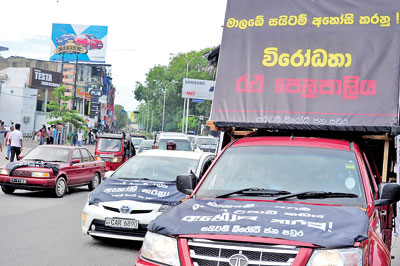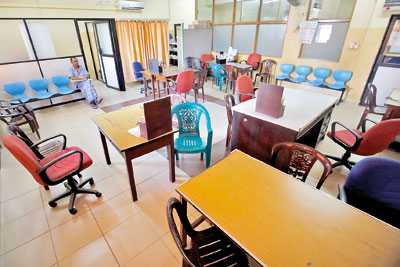News
Mixed reactions to report on SAITM
- “Majority reaction positive”
- Transparency & consensus Harsha’s aim
- “Accreditation authority will ensure quality higher education for all disciplines”
- SLMC “squarely” professional body for medicine
- SLMC “squarely” professional body for medicine
- “We are only interested in SAITM’s medical faculty”

Dr. Harsha de Silva making a point. Pic by Priyantha Wickramaarachchi
While the latest attempt to find a solution to the SAITM crisis – the Harsha de Silva Committee – drew mixed reactions after its report was released to the public last week, the issue is still at boiling point and no nearer to a solution than what it was when the committee was appointed.
The responses to the report on SAITM (South Asian Institute of Technology and Medicine) were “mixed”, Dr. de Silva told the Sunday Times in a lengthy interview on Thursday, pointing out that while the reactions were “good and bad”, a majority of people who have read it with an objective and sense of equity see it as “positive”.
This includes the bulk of the people, he says, explaining that groups on the “extreme-ends of the debate” see the report as not worth the paper it is written on. These are both pro- and anti-SAITM groups and this seems like a fantastic achievement for the committee because what more do you want.
When asked whether there had been ‘parallel’ discussions to resolve the SAITM issue, Dr. de Silva who is also Deputy Minister of National Policies and Economic Affairs, said it was not so, as he was very much a part of the discussions being held at Prime Minister Ranil Wickremesinghe’s Office as well. “There is only one discussion and the President and the Prime Minister are in ‘total agreement’ with the report.”
President Sirisena on August 30, appointed the five-member Harsha de Silva Committee with the other members being Higher Education and Highways Ministry Secretary D.C. Dissanayake; Health Ministry Secretary Janaka Sugathadasa; Attorney-General (AG) Jayantha Jayasuriya represented by Additional Solicitor General Sanjay Rajaratnam; and University Grants Commission (UGC) Chairman Prof. Mohan de Silva.
To the query, ‘What next’, Dr. de Silva detailed the ‘Proposed solution’ and the three recommendations with regard to: ‘Matters related to ownership and management of SAITM which included the abolition of the current shareholding and management structure of SAITM and creation of a new entity that is not-for-profit with a broad-based ownership structure’; ‘Matters related to the establishment of a legally empowered Minimum Standards for medical education and training’ and; ‘Matters related to a sustainable solution for accreditation and quality assurance in medical education’.
With regard to the first recommendation, Dr. de Silva said that currently as SAITM is a profit-making family business, the committee has suggested its abolition and the setting up of an institution with a changed structure in ownership and management.
When asked why the government should abolish the whole of SAITM of which medicine is only a part, he was categorical that “we are not interested in other things except medicine. Anith eva mata adala ne”.
Every credible, acceptable higher education entity including SLIIT (Sri Lanka Institute of Information Technology) which is a success story is welcome to look at this, he said, when asked why only SLIIT was being considered. “I give my word that I’m transparent,” he said.
The proposed Minimum Standards for medical education have been in the eye of the cyclone and Dr. de Silva said that it is critical to have Minimum Standards. Even though the Sri Lanka Medical Council (SLMC) had provided a draft earlier, the AG’s Department had informed the committee that the SLMC had withdrawn these Minimum Standards. “Whatever the reason, no legally-valid document with regard to the Minimum Standards is available. I’m looking at it progressively. We need a legal set of Minimum Standards for medical education – state or private.”
Pointing out that at the meeting coordinated by the PM’s Secretary, it was decided that views on the draft of the higher education bill should be gathered, he said that the UGC asked for a special meeting and the observations, comments and views gathered at that meeting were sent to the SLMC. Now the SLMC and the government must agree on the Minimum Standards and submit them through the Health Minister to Parliament.
“We have in our recommendations suggested the right way to approve the Minimum Standards. The SLMC draft should be given to the government and the government should send it back to the SLMC with its views after which there should be a discussion which should be followed by consensus,” he said.
When asked about the proposal to set up an Independent Quality Assurance and Accreditation Authority (IQAAA) which has brought on howls of protest, the Deputy Minister said that discussions on such a body started 14 years ago. “When the SLMC said that it did not know anything about it, I instructed that a draft be provided the very next day as I believe in transparency and achieving consensus. This is what democracy is all about, achieving consensus after discussion. This is all a part of good governance.”
The IQAAA draft exists and it will certainly be discussed at length, said Dr. de Silva detailing why such a body is required. There are two levels at which it will function:
- To ensure quality and acceptability of all higher education qualifications granted by any institution in the country, be it state or private. This is to provide accreditation, which is basic to any course of study whether it is medicine, law, engineering etc.
- Each discipline will have a specified professional body and for medicine it will be “no one else” but the SLMC. At the moment, the sole authority is the Higher Education Ministry Secretary and the UGC. “My recommendation is that it should be the SLMC – to give the SLMC due power and authority, with the SLMC working in collaboration with the IQAAA,” he said, much like the “hub and spoke”.
Stressing that the recommendation is to create an accreditation authority and for SLMC to be the recognized professional body, he said that for law it will be the Council for Legal Education. These recommendations “squarely” put the SLMC as the professional body for medicine.
This is important for all professions as we need to come up with a long-term national policy and this falls within our mandate. National policy-making cannot be handled by a single ministry and as such we have to come up with such a policy, of course in consultation with all the ministries, he said adding, “My mantra is evidence-based policy-making. For a long time in this country people have been shooting off the hip – with no data to substantiate what is said.”
With regard to admissions to SAITM, Dr. de Silva was quick to point out that soon after the committee report was submitted to President Sirisena, the first legal letter instructing SAITM to stop admissions was sent, with clear instructions that it should get “fresh approvals” which would come from the legal Minimum Standards.
When asked how the proposed not-for-profit body for SAITM’s medical faculty would work, he in turn queried whether profit is the only motive of human kind. Citing examples such as Stanford and Rockefeller, he said that many have channelled their wealth to charity and built hospitals and much more. In profit-making bodies, there is distribution of dividends, but not in the not-for-profit organizations.
According to the Deputy Minister the vast majority of people who have no direct interest say the Presidential Committee Report is “progressive” and that the “government has gone 75% and the others just need to go 25%”.
He cites a recent speech by former American President Barack Obama to black graduands – even if you are 100% right, in a democracy you have to compromise.
“This is why we are stating as a legitimate government – this equitable compromise is being offered as a solution, so accept it and let’s work on it,” added Dr. de Silva.
Please see the full Harsha de Silva Committee Report and the critical analysis of the report by the Federation of Faculty of Medicine Teachers’ Association of Sri Lanka (FFMTA)

Last week's GMOA strike againt SAITM: A protest rally in Colombo and (below) a lone patient at an OPD in the National Hospital. Pix by Amila Gamage and M.A. Pushpa Kumara
| SLMC to discuss report next Friday – no dilution of SLMC powers will be acceptable | |
| The Sri Lanka Medical Council (SLMC) is to take up the Harsha de Silva Committee Report at length at its monthly meeting next Friday (September 29).While hailing the move to stop admissions of new medical students to SAITM, as “the SLMC’s position is that SAITM has failed to meet the standards stipulated by the SLMC”, it is learnt that the SLMC was of the view that the members who met the committee did not “formally” agree with the proposed re-structuring process on the grounds that it needed to be studied in-depth.The SLMC has also been very specific on certain factors, sources told the Sunday Times. “Whatever re-structuring is done, the powers of the SLMC with regard to ensuring Minimum Standards for medical and dental education should not be diluted in any form,” the source said, adding that no other body, than the SLMC, should have the power to amend these Minimum Standards, ascertain compliance with such standards and recognize higher educational institutes which award medical and dental degrees.Another source stressed that no amendments to laws or new laws should be brought in which would impact on the powers and functions of the SLMC, without getting total agreement from the SLMC. |

| SAITM agrees in principle to broad-base ownership | |
| “SAITM has agreed in principle to broad-base the ownership. As always, SAITM will extend its fullest support to the Government’s efforts in maintaining quality and standards of medical education in Sri Lanka,” stated SAITM’s Registrar Husni Hussain when contacted by the Sunday Times to get its view on the Harsha de Silva Committee Report.She said that they welcome the initiative to establish legally-empowered standards since it would help to alleviate ad hoc decision-making when only guidelines are used. Prescribed Minimum Standards should include current world trends and address the observations of all medical faculties.They should be applicable to both state and non-state faculties sans discrimination. Accreditation and quality assurance will ensure that standards in medical education are maintained. We leave it to the Government to formulate a suitable mechanism,”With regard to the action recommended by the committee to trigger the proposed solution and to negotiate to end the boycott of medical students of state universities, Ms. Hussain states that the discipline of the students is a matter for the Deans of the respective faculties. The Secretary, Ministry of Higher Education as the specified Authority has already informed SAITM in writing to temporarily suspend student admission to the MBBS Programme, she says, adding that SAITM will abide by the laws of the country and extend its fullest cooperation to the Government to formalize a just and expeditious solution for its undergraduates and MBBS Graduates, subject to court proceedings. |

